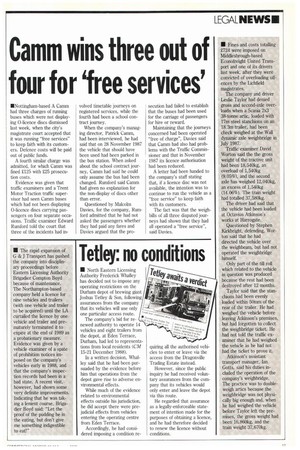Camm wins three out of four for 'free services'
Page 19

If you've noticed an error in this article please click here to report it so we can fix it.
• Nottingham-based A Camm had three charges of running buses which were not displaying 0-licence discs dismissed last week, when the city's magistrate court accepted that it was running "free services" to keep faith with its customers. Defence costs will be paid out of public funds.
A fourth similar charge was admitted, for which Camm was fined 2125 with £25 prosecution costs.
Evidence was given that traffic examiners and a Trent Motor Traction traffic supervisor had seen Camm buses which had not been displaying 0-licence discs carrying passengers on four separate occasions. Traffic examiner Edward Rumford told the court that three of the incidents had in volved timetable journeys on registered services, while the fourth had been a school contract journey.
When the company's managing director, Patrick Camm, had been interviewed, he had said that on 28 November 1987 the vehicle that should have been used had been parked in the bus station. When asked about the school contract journey, Camm had said he could only assume the bus had been changed. Rumford said Caitlin had given no explanation for the non-display of discs other than error.
Questioned by Malcolm Davies, for the company, Rumford admitted that he had not asked the passengers whether they had paid any fares and Davies argued that the pro secution had failed to establish that the buses had been used for the carriage of passengers for hire or reward.
Maintaining that the journeys concerned had been operated "free of charge", Davies said that Camm had also had problems with the Traffic Commissioner and that in November 1987 its licence authorisation had been reduced.
A letter had been handed to the company's staff stating that, if a licence disc was not available, the intention was to continue to run the vehicle as a "free service" to keep faith with its customers.
The fact was that the weighbills of all three disputed journeys had shown that they had all operated a "free service", said Davies.
































































































